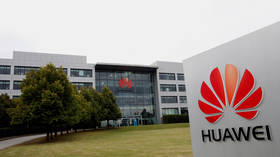UK’s report on Huawei 5G ‘threat’ offers no evidence and proves US is pulling strings in Downing Street

A new report seeking to justify the UK’s U-turn on Huawei’s involvement in its 5G network has proved what many doubters thought all along – the decision had little justification and was driven by America’s anti-China crusade.
The United Kingdom Parliamentary Committee on Defence this week released its long-awaited report on The Security of 5G. With the subtitle “We must not surrender our national security for the sake of short-term technological development,” the report focuses primarily on the role of Chinese telecommunications company Huawei and its participation in Britain’s networks, following the government’s U-turn on Huawei’s role and the banning of its involvement, with a phase-out period until 2027.
The MPs who advocated the report claimed they “had seen clear evidence” of the firm’s “collusion with the Chinese Communist Party apparatus.”
Despite this, the report itself offers no smoking gun, nor does it give demonstrable public proof of these claims, apart from setting out a ‘guilt by association’ argument. This has been the usual line against Huawei.
It also fails to come to terms with the fact that the UK authorities approved Huawei’s role in the UK’s 5G roll-out as safe in January with a national security review, and then subsequently decided to change their mind a few months later, after arm-twisting by the US and right-wing rebellion in the House of Commons.
Also on rt.com ‘Clear evidence of collusion’ between Huawei and Chinese Communist Party – UK Parliament reportThe UK had initially approved a limited role for Huawei in its 5G networks, which involved keeping the company out of the ‘core’ and ‘focusing on the periphery.’ This decision was a big blow to the US, who’d demanded a ban on the company and relentlessly pushed the issue as a security threat, without providing evidence.
The report itself acknowledges that the UK government security review ruled working with Huawei as safe, but challenges this via dubious sources. For example, it uses notorious hard-right US senator Tom Cotton as an ‘expert source’ to say the UK government was wrong, stating: “Senator Tom Cotton, United States Senator for Arkansas, told us that the USA’s technical experts along with those in Australia and Japan disagree with the NCSC’s [National Cyber Security Centre] position.”
Cotton recently said that Chinese students should learn about America by studying Shakespeare, so it’s hard to see what he might know about network security. Yet that isn’t the only time he’s quoted, as the report notes: “Senator Tom Cotton told us that his reaction was similar to that of the US Government in that the announcement disappointed him.”
Rather than providing any evidence that the initial decision was wrong, this area of the report reads more like a monologue as to why the US – or this senator in particular – didn’t like it. It is even forced to concede that “the NCSC told us that the case for complete exclusion of Huawei could not be made on cyber security grounds alone.”
This is a damning admission. The report subsequently follows through by attempting to play up the China threat. It first states that the UK is “at risk of cyber-attacks” and that this is a “tier-one threat.” Again, without providing evidence against Huawei itself or of its involvement, it also claims that China has engaged in endless cyber-attacks against the UK.
In stating this, it subsequently omits the fact that Huawei has participated in British networks for decades, with no obvious negative consequences. Then, to spice it up more, it cites yet another Republican congressman. “Mike Turner, a member of the US House of Representatives from Ohio, told us that China has been very active in hacking both the United States and the UK, stating that it seeks personal information on our citizenry and those who serve in Government.”
From this, it then moves onto its ‘guilt by association’ smoking gun. It talks about China’s “national intelligence law” and then states, “The company itself is malicious and acting under the control of a state hostile to the UK.” It accuses Huawei of being “compelled to covertly build in malicious functionality to its products that can be exploited once the equipment is installed.”
Yet, despite saying this, the report is again forced to conclude that “[w]hilst the NCSC have not seen any specific evidence in respect of the UK, given its close relationship with the Chinese state, this scenario is their standing assumption since Huawei entered the UK market in 2003.”
So, wait… there is no evidence at all? Surely that means the report fails to live up to its premise? It should be quite obvious what is going on here; the report is not empirical, but political. Most of the “geopolitical considerations” section resembles a laundry list of reasons as to why the US says Huawei is bad, and therefore there “might” be a risk based on the premise of what China is and what the company is associated with, rather than any proof of what it has actually done.
Given this, Huawei was absolutely right to say the report lacks credibility. In fact, this is being kind, because the document fails to even counter the arguments of Britain’s own national security council, who in January said Huawei’s involvement was safe and manageable.
What exactly has changed in Huawei between now and then? Nothing. But now Downing Street and Westminster have decided to jump on America’s anti-China bandwagon, and clearly there’s a belief that listening to the thoughts of some dubious congressman and senator passes for a balanced assessment on the merits of this company.
Think your friends would be interested? Share this story!
The statements, views and opinions expressed in this column are solely those of the author and do not necessarily represent those of RT.














